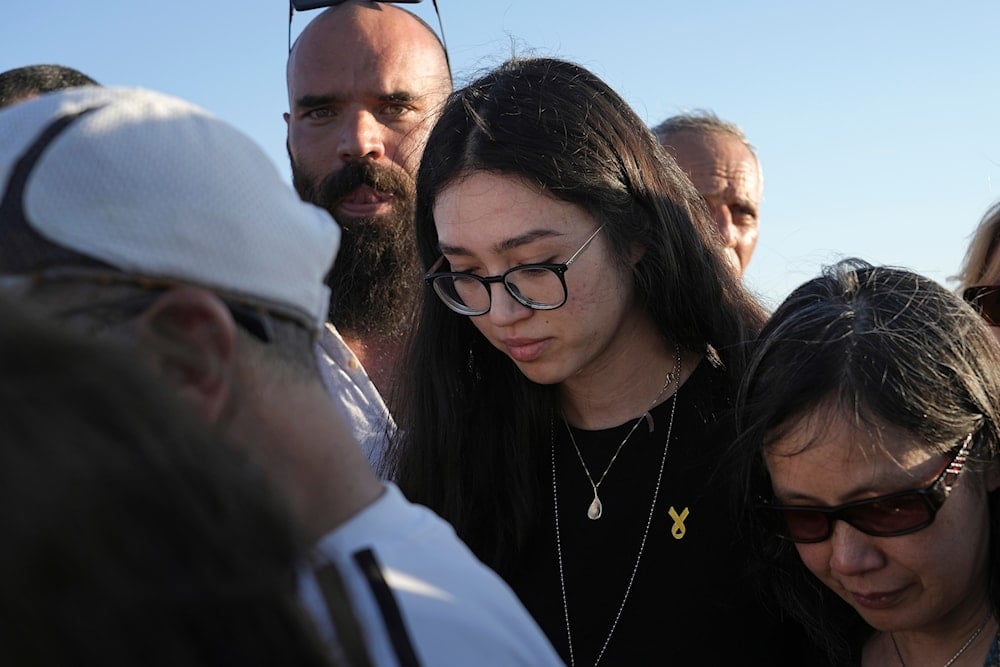Released captive refutes Israeli claims of abuse, beating by Hamas
After being retrieved by Israeli forces, the Israeli captive stresses that Hamas did not abuse her, highlighting that her wounds came from Israeli bombing.
-

Israeli captive Noa Argamani, center, stands at the grave of her mother Liora Argamani on July 2, 2024. (AP)
In her first public remarks since being released from Gaza, Noa Argamani recalled being taken captive on October 7, explaining how she was covered in cuts and endured severe pain all over her body and reflecting on her retrieval.
She met with Japanese Foreign Minister Yoko Kamikawa on Thursday and spoke of her experience in captivity.
“And in this moment that I’m still sitting with you, it’s a miracle that I’m here. It’s a miracle because I survived October 7, and I survived this bombing, and I survived also the rescue,” Argamani said of her release.
With no regard for their captives, Israeli forces massively bombed the area, committing a massacre of Palestinian civilians, which also harmed the Israeli captives.
During the operation for the retrieval of four captives, including Argamani, Israeli occupation forces launched numerous airstrikes on the Nuseirat refugee camp in central Gaza, which led to the death of at least 210 Palestinians and injury of 400.
A team of American experts stationed in Israeli-occupied lands supported the Israeli military in retrieving the four captives by giving information and other logistical support, according to one American official, who spoke anonymously to discuss the delicate operation.
A senior Israeli official told the NYT that the US and UK have been in "Israel" throughout the war on Gaza, assisting Israeli intelligence in gathering and analyzing information about the captives, some of whom are citizens of both countries.
Two Israeli official sources cited that US military officers gave the occupation information regarding the retrieved captives.
Argamani refuted media reports that she was beaten by Hamas, as she went to social media on Friday to say that her words had been taken out of context.
She affirmed she was not beaten and her hair was not cut.
"I said, I had cuts all over my head and I was hurt all over my body," which was taken out of context, according to Argamani, who emphasized that her wounds were the result of the collapse of a building after it was bombed by the Israeli forces
"As a victim of October 7, I will not allow myself to be victimized once again by the media," she said.
Israeli captives retrieved from Gaza were killed by IOF
This comes three days after the Israeli occupation forces revealed that their operations back in March could have killed the Israeli captives who were retrieved from an alleged tunnel in Gaza, Israeli Channel 12 reported.
Estimations show that five out of the six captives were killed by Israeli fire during the ground invasion of Khan Younis six months ago, according to Israeli media.
In the same context, The Wall Street Journal cited Israeli security officials as saying that it is generally believed that "more hostages will return killed," if a ceasefire deal that could save them is not reached.
The newspaper claimed that most security officials in the occupation "insist that reaching an agreement is the only way to secure the release of the remaining 105 captives," who were taken on October 7.
Israeli Prime Minister Benjamin Netanyahu still faces pressure and criticism regarding the Israeli captives because he continues to sabotage the ceasefire talks, which could retrieve them back to the occupied land.
Protests continue erupting in Tel Aviv against Netanyahu’s policies, with demonstrators demanding a prisoner exchange deal with the Palestinian Resistance. Some protesters threatened that if Netanyahu did not resign, they would ensure his death.
Families of Israeli captives being held in the Gaza Strip demonstrated on Saturday evening, urging the government to finalize a prisoner swap. They criticized Netanyahu's conditions, claiming they are obstructing the agreement.

 4 Min Read
4 Min Read








